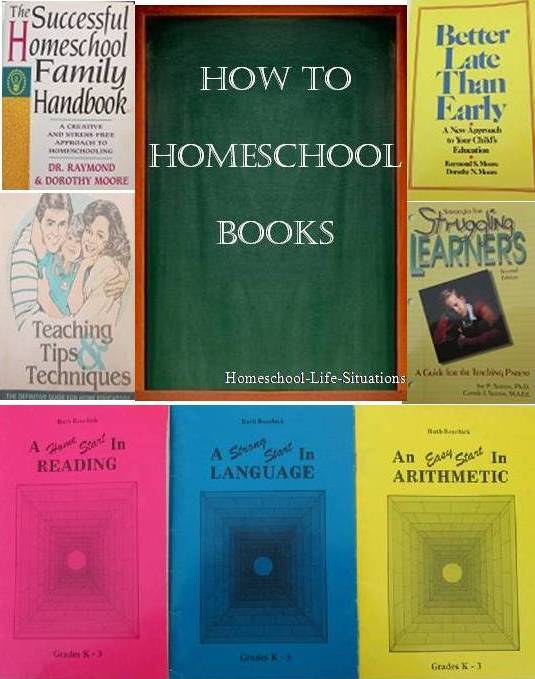How to Homeschool Book List
When you need a little encouragement or help you can read a how to homeschool book. There is information about how to educate your child, different teaching methods, and homeschooling children with special needs.
I find reading about what others have done to be enjoyable and helpful. For each book I have read I have found new insights for educating my child.
All of the books that I have listed I have personally read. Many I found at my local library.
General / Beginning
When I first started teaching my children I liked to read a how to homeschool book once a year. I started by reading books by Dr. Raymond Moore.
I still believe in beginning formal education until the child is ready to learn. He recommends not starting school until your child is eight. Before eight your child can learn by observing, discussing, and hands-on activities.
I did start formal education earlier than eight because my children wanted to do school.
- Better Late Than Early: A New Approach to Your Child's Education by Raymond S. Moore, Dennis R. Moore and Dorothy N. Moore
- The Successful Homeschool Family Handbook by Dorothy Moore and Raymond Moore
I also read books by Ruth Beechick such as;
- A Home Start in Reading (Grades K-3) by Ruth Beechick
- An Easy Start in Arithmetic (Grades K-3) by Ruth Beechick
- Strong Start in Language: Grades K-3 by Ruth Beechick
In Ruth Beechick’s books on teaching grades K-3 she shows how children learn. An example is in the arithmetic book she says that a child will go through three stages, the manipulative, the mental image, and the abstract. Young children need lots of experience manipulate real objects before they can move to doing math in their head. Then children need to be able to visualize math problems in their head before they can do abstract problems on a worksheet.
Ruth also has books for older children.
- You Can Teach your child Successfully: Grades 4-8 by Ruth Beechick
There are ideas for teaching spelling, grammar, and using real books for learning.
Another beginning book;
- Teaching Tips and Techniques: The Definitive Guide for Home Educators by Rebecca L. Avery
I used Teaching Tips a lot my first years of teaching. It was
written by the author of the Weaver. I found lots of ideas for teaching
writing, reading, math, science, and history. Some of the other chapters were
on how children learned. In the appendix there are lists of books to read for
each grade level. There is even a spelling list for each grade.
In later years I have read;
- What Your Child Needs to Know When: According to the Bible, According to the State: with Evaluation Check Lists by Robin Sampson
I was impressed with the book’s reasons why we should use a biblical approach to teaching. Robin really goes over the difference between different worldviews. There is also an academic checklist for what children should know in kindergarten through the eighth grade.
Recently I have read;
- Beyond Survival: A Guide to Abundant-Life Homeschooling by Diana Waring
The book is very enjoyable and encouraging. Diana stresses that homeschooling is a relationship.
Styles
There are also how to homeschool books that deal with different teaching styles.
- The Well-Trained Mind: A Guide to Classical Education at Home by Susan Wise Bauer and Jessie Wise
I read The Well-Trained Mind several years ago. It describes the classical approach. I liked how she described what to teach when. Susan Wise Bauer writes in a very conversational style so the book is easy to read.
Children with Special Needs
- Homeschooling the Child with Asperger Syndrome: Real Help for Parents Anywhere and On Any Budget by Lise Pyles
Lise Pyles has good ideas for teaching social skills. Some of her tips include discussing actor's interactions on TV and making face cards to show different emotions.
- Homeschooling the Challenging Child: A Practical Guide by Christine Field
Christine Field gives a Christian perspective to homeschooling children who have special needs. She talks about the pros and cons of diagnosing, some of the most common disabilities, how to discipline, and the stages of grief that a family will go through when a child is challenging.
- Strategies for Struggling Learners a Guide for the Teaching Parent by Joe P. Sutton PhD
This book has some good ideas for making curriculum tailored made for your child. He also talks about how to teach so the child will learn. I read this book some time ago and it may be out of print. It is a good read if you can find a copy.
High School
- The Ultimate Guide to Homeschooling Teens by Debra Bell
This book has helped me see what my middle school child needed to do before he would be successful in high school. Some of the skills that he needs to learn is time management, computer skills, and study skills. Each subject also has specific skills that need to be learned.
How to Find Curriculum
- 101 Top Picks for Homeschool Curriculum by Cathy Duffy
101 Top Picks is one of the best how to homeschool book about curriculum. You will find materials that match your teaching style and your child's learning style. New versions of the books come out periodically. 101 Top Picks is the latest. It was published in 2012.
What is your favorite how to homeschool book?
Leave How to Homeschool Book for Homeschooling Organization
Return to the home page


New! Comments
Leave me a comment in the box below.